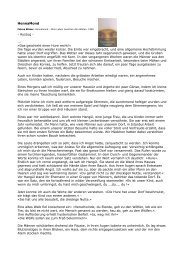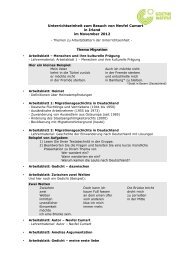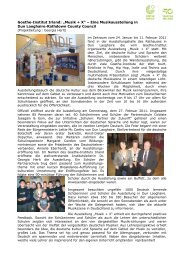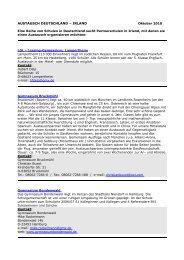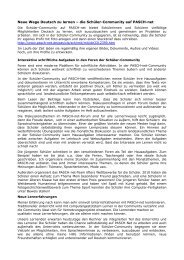Short Guide to German Pronunciation - updated ... - GDI-Bulletin 2012
Short Guide to German Pronunciation - updated ... - GDI-Bulletin 2012
Short Guide to German Pronunciation - updated ... - GDI-Bulletin 2012
You also want an ePaper? Increase the reach of your titles
YUMPU automatically turns print PDFs into web optimized ePapers that Google loves.
<strong>Short</strong> <strong>Guide</strong> <strong>to</strong> <strong>German</strong> <strong>Pronunciation</strong> - <strong>updated</strong><br />
The following is a collection of individual <strong>German</strong> sounds and their pronunciation. For easier<br />
understanding they are being put in<strong>to</strong> relation with familiar English and Irish sound features,<br />
i.e. explained from an English-speaking perspective.<br />
VOWELS<br />
ä - The sound should be familiar through the way "bed" is pronounced in Irish English or "bad"<br />
or "hand" are pronounced in Received <strong>Pronunciation</strong> (RP).<br />
au - The <strong>German</strong> sequence is pronounced [au] as in English "plough" and not like in<br />
"Austin".<br />
ei, ie - in <strong>German</strong> is pronounced [i:] as in English "fierce" and "grief"; <strong>German</strong> is<br />
pronounced [ai], as in English "tie". Good examples for this mix-up:<br />
"Leid" means sorrow, "Lied" means song; depends on the pronunciation whether one is<br />
listening <strong>to</strong> a song or someone else's hardship.<br />
Another example <strong>to</strong> practise this with the students:<br />
"Sie schliefen im Bett." They slept in the bed.<br />
"Sie schleifen im Bett." - They are sanding (possibly the bed frame) while in bed.<br />
Fierce important!...could be a clue <strong>to</strong> remember.<br />
eu - <strong>German</strong> is pronounced [oi] like English "boy", and not [ju] like "Europe".<br />
Boy, so many people do this wrong!<br />
ö - The long ö, as in "schön", is pronounced starting with a long [e:] sound, such as in <strong>German</strong><br />
"Leben" or Irish-, Scottish-, Ulster Irish English "face",<br />
and pursing the lips while holding the [e:] sound.<br />
The method for pronouncing the short ö, like in <strong>German</strong> "Löffel", is the same, however, starting<br />
with the ä sound above.<br />
ü - The long ü, as in <strong>German</strong> "üben" is pronounced starting with the long [i:] as in <strong>German</strong><br />
"Lied" and English "cheap" and pursing the lips whilst holding the [i:] sound.<br />
The method for the pronunciation of the short ü, like in <strong>German</strong> "müssen" or Scottish/Ulster<br />
Irish English "book", is the same, whilst the <strong>to</strong>ngue is not raised quite as highhas when<br />
pronouncing the long ü.<br />
SEMI-VOWELS<br />
j - This is pronounced like English as in "young". English "ya" and <strong>German</strong> "ja" sound<br />
exactly the same.<br />
CONSONANTS<br />
ach - The <strong>German</strong> sound [X] corresponds with Scottish "loch" and a number of "ll" words in<br />
Welsh and, in most regions, equals the Irish "Gaeltacht".<br />
ich - The <strong>German</strong> sound [ç] sounds like overdoing the /h/ in English "huge".<br />
The common misconception that the <strong>German</strong> ich sound and the sound in Irish<br />
"fiche" or "iche" are the same is not true.<br />
The ich sound in Irish is articulated further back in the mouth - it is a fricative sound where we<br />
usually pronounce the [k] as in "cat".<br />
When we pronounce the <strong>German</strong> sound, the place where the <strong>to</strong>ngue is closest <strong>to</strong> the roof of<br />
the mouth is the hard palate.<br />
Makes a HUGE difference!<br />
pf, ps - These consonant sequences as in <strong>German</strong> "Pferd" and "Psychologie" do not occur in<br />
English at the beginning of words but only cross-sylable,<br />
such as "<strong>to</strong>p five" and at the end, such as "He sleeps."<br />
qu - Unlike in English, in <strong>German</strong> is pronounced [kv]. You will recognize it in the<br />
example "...spoke very..." if you focus on the last sound in "spoke" and the first sound in<br />
"very".
- For this sound we should look at a few other sounds first:<br />
[f, v] - English "veal" is pronounced with a [v] whilst <strong>German</strong> "viel" is pronounced with an [f]<br />
sound, like English "feel". Sticking a finger (gently) in<strong>to</strong> our ear and saying the word "feel"<br />
(or <strong>German</strong> "viel") and then the word "veal", we will feel our vocal cords vibrate when saying<br />
the latter.<br />
[s, z] - English "sea" is pronounced with an [s] sound, whilst <strong>German</strong> "sie" is pronounced with<br />
a [z] sound, like in "New Zealand". Sticking a finger (gently)in<strong>to</strong> our ear and saying "sea"<br />
followed by "New Zealand", we will feel a vibration again.<br />
Hence [f] and [v] and [s] and [z] are pairs of voiceless-voiced sounds.<br />
Otherwise the pronunciation is the same.<br />
The <strong>German</strong> is basically a voiced version of the <strong>German</strong> sound;<br />
like [v] is the voiced form of [f] and [z] is the voiced form of [s].<br />
Putting our finger in<strong>to</strong> our ear and saying the word "Fach" we should not feel any vibration,<br />
but when saying "Fahrrad" we should feel it.<br />
s - <strong>German</strong> in the beginning of a word (or sylable) is always pronounced [z],<br />
such as in "sie", which sounds like "New Zealand". In English, in<br />
the beginning of a word ( or sylable) is always pronounced [s].<br />
sp, st - This sequence is pronounced like it says in the Irish saying [shticks and sh<strong>to</strong>nes].<br />
The same applies <strong>to</strong> "Spiel" being pronounced [shpeel].<br />
ß - This unfamiliar letter is pronounced [s] as in "großen Spaß".<br />
v - <strong>German</strong> knows two ways of pronouncing , as [v], such as in "Verb", and as an [f]<br />
sound, like in [viel]. (The former applies <strong>to</strong> words of Latin origin and the latter <strong>to</strong> those of<br />
<strong>German</strong>ic origin.)<br />
If a written <strong>German</strong> word with [v] looks considerably like an English word, chances are good<br />
that is pronounced the English way; for example, "Verb, Version, Observa<strong>to</strong>rium,<br />
investieren, Vase".<br />
If there is no English word that looks like the <strong>German</strong> word with , the sound will be [f];<br />
for example: "viel, vor, voll, Vater, verlaufen, verstecken"<br />
(and all the other ver-prefixes.<br />
w - <strong>German</strong> is pronounced [v], hence the Plural "die Verben" and the infinitive "werben"<br />
(<strong>to</strong> advertise) sound the same.<br />
z - The sound sequence [ts] in the beginning of a word exists in English only in "tsunami",<br />
"tse-tse fly" and t's me!". In <strong>German</strong>, the sound sequence [ts] can occurr in all positions.<br />
Furthermore, it is nearly always represented by the letter z (also tz). In English the letter z<br />
is pronounced [z], which causes difficulties for English-speaking learners of <strong>German</strong>.<br />
However, the <strong>German</strong> sound and the letter exist <strong>to</strong>gether in English in the word "pizza".<br />
Once students have been made aware of this, we can practise little phrases like "die Zahl.<br />
[ts] in "Pizza" and "die Zahl" occur in the same phonetic environment, therefore there is no<br />
reason why students should be unable <strong>to</strong> pronounce "z" in "Zahl" and other words with the<br />
letter.<br />
Should any questions remain unanswered:<br />
Markus.Boettner@gmail.com Twitter/skype MarkusBoettner


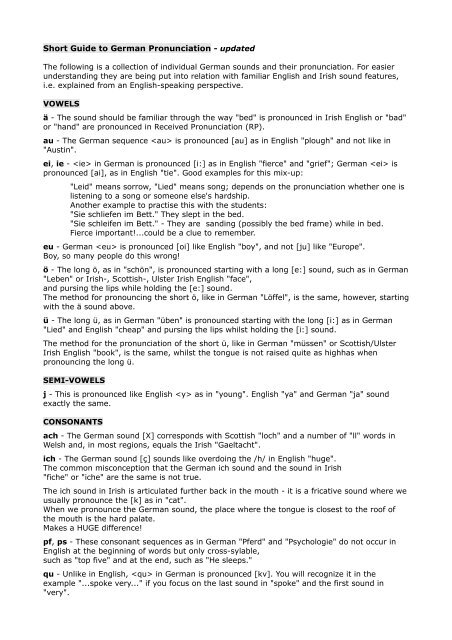
![Bulletin 2010 [PDF] - GDI-Bulletin 2012](https://img.yumpu.com/19074790/1/184x260/bulletin-2010-pdf-gdi-bulletin-2012.jpg?quality=85)
